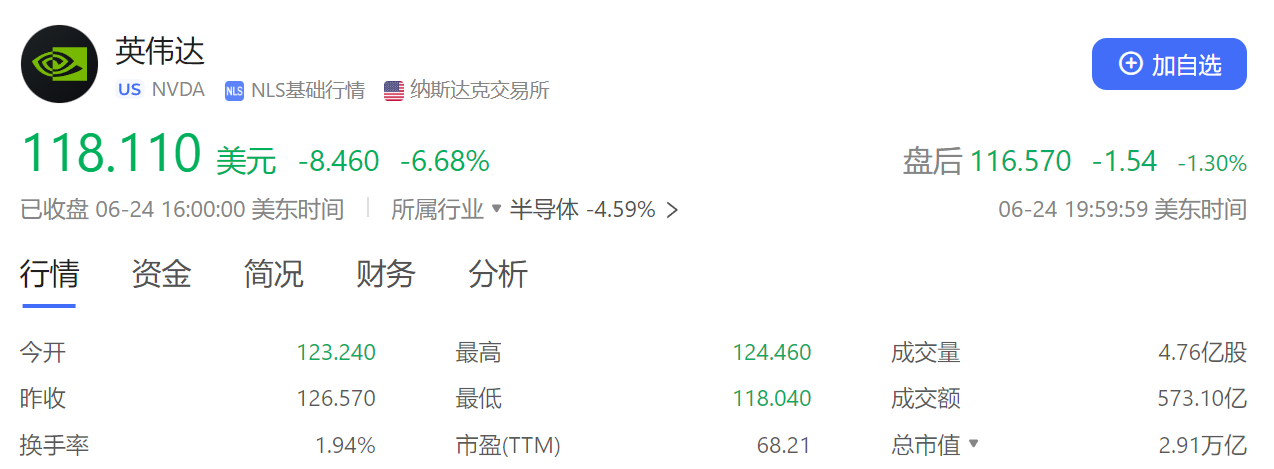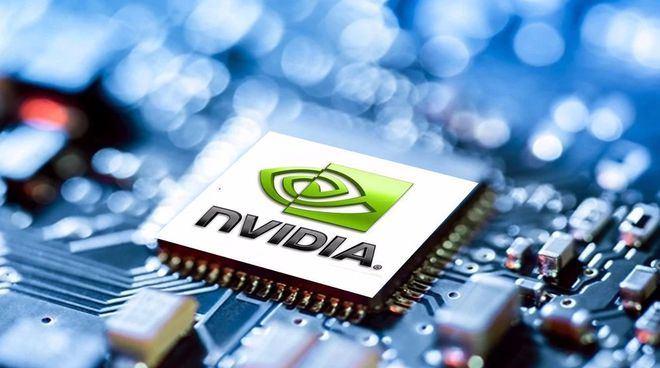Nvidia fell 16% in three days! Jensen Huang and other executives have cashed out
Nvidia has experienced a decline for the third consecutive trading day, with a cumulative loss of $550 billion in market value.
On Monday (June 24th), Nvidia's stock price plummeted by 6.7%, closing at $118.11, and its market value fell below $3 trillion.

Nvidia falls 3 days in a row, dragging down the market
This is the third consecutive trading day for Nvidia to experience a decline, with a cumulative loss of $550 billion in market value. Currently, Nvidia's stock price has fallen 16.1% from its all-time high of $140.76 on Thursday. This also means that Nvidia's stock price has entered a technical correction for the first time since April (the stock price has fallen by 10% or more from its recent high).
Except for Nvidia, other chip stocks have also been declining recently. The Philadelphia Semiconductor Index has fallen nearly 7% in the past three trading days. On Monday, the Nasdaq Composite Index, mainly composed of technology stocks, fell 1.1%. Meanwhile, the chip manufacturer index fell by 3%, with 29 out of the 30 stocks it covers experiencing a decline.
Several popular chip related stocks have all experienced varying degrees of decline. Arm's stock price fell 5.8% on Monday, while Dell fell 5.2%, both of which have fallen for the third consecutive day. Broadcom's stock price fell by 3.7%, giving back more than half of its recent gains. In addition, TSMC's stock price fell by 3.5%. Super Micro's stock price plummeted 8.65% on Monday.
The decline of Nvidia has brought pressure to the entire market. Despite most sectors rising, it still closed down 0.3% on Monday. According to statistics, Nvidia's stock price has risen by about one-third of the S&P 500 index's rise in 2024.
"If Nvidia experiences a significant pullback in the coming months, it will be difficult for the S&P 500 index to continue rising," said Barry Bannister, Chief Stock Strategist at Stifel.
Analysts have different opinions on the significant impact of star stocks like Nvidia on the overall market.
Marko Kolanovic of JPMorgan Chase believes that the shrinking number of stocks driving the US stock index is worrying. From a historical perspective, it is not a good omen either.
Matt Maley, Chief Strategist at Miller Tabak, said that if the weakness of several large tech stocks spreads to other tech stocks, it is likely to bring some problems to the entire market, at least in the short term.
Morgan Stanley strategist led by Mike Wilson stated that only a few high-quality super large cap stocks are driving the performance of the US stock market, indicating that the market is more focused on slowing economic growth rather than inflation and interest rates. The team also emphasized that, based on historical performance, it is not necessarily a bad thing for a few stocks to drive the overall market up. The team expects that this situation will continue until growth slows down in a more meaningful way.
Emily Bowersock Hill, an analyst at Bowersock Capital Partners, has a more optimistic outlook. She said: "There is no foam in the stock market. Although the valuation of large growth stocks is too high, the stock price is not as divorced from the fundamentals as it was during the technology foam in 2000." She pointed out: "On the one hand, the high valuation of Nvidia is ridiculous. On the other hand, the AI revolution is expected to become a reality and bring rich returns to companies at the forefront."
Manish Kabra, head of US equity strategy at Societe Generale, said that Nvidia's Monday sell-off was "a super healthy development for the market.". Abra said: "Either the market rebounds and expands, or we form a foam (technology stocks) that has not yet been formed."

Chip stocks surge, executives have cashed out
According to regulatory documents submitted by Nvidia to the US Securities and Exchange Commission (SEC), CEO Jensen Huang sold a total of 720,000 Nvidia shares worth $94.6 million between June 13th and 21st, with an average price per share of $131.44.
According to the documents, Jensen Huang sold these stocks through the 10b5-1 trading plan approved on March 14th.
Now, Jensen Huang still holds a large amount of Nvidia stocks directly or indirectly. Among them, individual accounts hold 80.7 million shares of Nvidia stock, 605 million shares are controlled through trusts, 49 million shares are held through partnerships, and 132 million shares are held through other trust methods.
It is understood that when Jensen Huang submitted his 10b5-1 trading plan in March this year, his original plan was to sell no more than 600,000 shares of Nvidia stock. Subsequently, Nvidia began implementing a 10-1 procurement plan after the closing on June 7th. That is to say, Jensen Huang's sales plan has also expanded tenfold, to 6 million shares. After deducting the 720,000 shares already sold, Jensen Huang has an additional 5.28 million shares to be sold, and this plan is expected to continue until March 2025.
Apart from Jensen Huang, other executives at Nvidia are also cashing out. According to data from Washington Service, after excluding the impact of stock splits, Nvidia executives including Chief Financial Officer Colette Kress and Executive Vice President Deborah Shoquist have recently reduced their holdings of approximately 770,000 shares and cashed out over $700 million.
In addition, executives from Micron Technology and Qualcomm have also been selling their stocks recently.
Sanjay Mehrotra, President and CEO of Micron Technology, has sold 457,280 shares worth a total of $52 million, with an average price per share of $113.65. Mehrotra's stock sales are similar to those of Jensen Huang, both of which were planned in advance. Mehrotra plans to sell stocks from January to June this year.
Since the beginning of this year, the stock price of Micron has soared by 64%, and the average selling price of Mehrotra's stock has also risen, rising from about $82 in early January to about $152 in mid June.
Cristiano Amon, President and CEO of Qualcomm, sold 40500 shares for $6.9 million in planned transactions from January to May, with an average price of $169.92 per share.
Amon has been serving as CEO since June 2021 and has not engaged in significant stock selling for several years until 2024. Since 2024, Qualcomm's stock price has risen by 47%. The average selling price of Amon's stock soared from approximately $150 in January to $190 in mid May.
·Original
Disclaimer: The views in this article are from the original Creator and do not represent the views or position of Hawk Insight. The content of the article is for reference, communication and learning only, and does not constitute investment advice. If it involves copyright issues, please contact us for deletion.